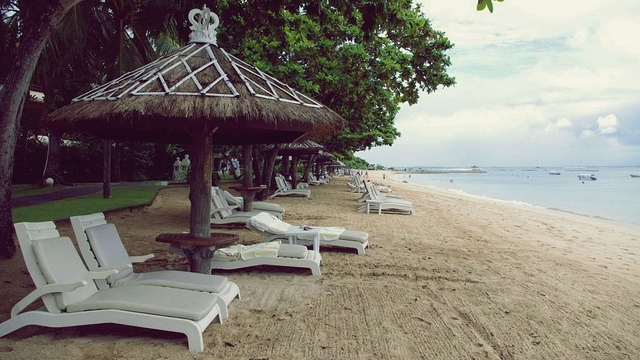The Indonesia Tourism Development Corporation, better known as the ITDC complex, in Nusa Dua is supposedly all booked up for the upcoming annual IMF-World Bank meeting to be held in Bali next month.
Don’t even think of trying to get a room at one of the many five-star hotels from Oct. 8 to 14 this year, because all those rooms have apparently been blocked out for the thousands of delegates coming to the Island of the Gods for the much-anticipated meeting. (However, a recent search on hotel booking site Agoda, conducted by Coconuts Bali, shows some rooms available in ITDC resorts during the week of Oct. 8, like at the St. Regis and Courtyard Marriott, so the hotels and ITDC better get their bookings sorted.)
A total of 5,300 rooms have been prepared for the delegates, according to ITDC managing director, Abdulbar M. Mansoer.
The complex will be closed to the public, says Mansoer.
“All hotels in the Nusa Dua area have been reserved for the delegates. This means that there are no other guests besides those from the IMF delegation,” he said, as quoted by Bali Post.
For the most part, delegates will start arriving about three days before the meeting, estimates Mansoer.
The annual meeting is expected to spur economic growth in Bali.
Indonesia’s Minister of National Development Planning, Bambang Brodjonegoro forecasts that Bali’s economy will grow by 6.5 percent by the end of the year.
Bali experienced a slump last year, with 5.59 percent economic growth in 2017, down from 6.5 percent in 2016, the minister said in Jakarta on Monday.
The downturn is believed to be a result of the island’s erupting Mount Agung, which also led to a reduction in the number of visits from foreign tourists and a decrease in exports of goods and services last year.
If there were no IMF-World Bank meeting, Bali’s economic growth would probably only be at about 5.9 percent by the end of 2018, Brojonegoro said.
“But because there’s the IMF-World Bank meeting, the Balinese economy will rise 0.64 percent. So, our estimate for economic growth in Bali at the end of 2018 is 6.54 percent,” the minister said, as quoted by VOA Indonesia.
To break down the 0.64 percent, Brojonegoro says that 0.12 percent of that growth will come from hotels, 0.05 percent from food and beverage, 0.26 percent from construction, and 0.21 percent from “others”.
Indonesia has spared no cost getting Bali ready for the meeting, pouring out IDR5.9 trillion (US$397.2 million) into infrastructure projects like the Ngurah Rai underpass, development of the Benoa Port—which will eventually become a cruise terminal or port for more tourist boats—and the construction of a massive sculpture in the hills of the Bukit Peninsula.
“The main infrastructure is of course not only for the World Bank-IMF. The infrastructure being built will certainly be long lasting. It will continue to be used to support Bali’s economic activities,” Brojonegoro said.




